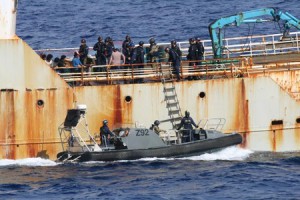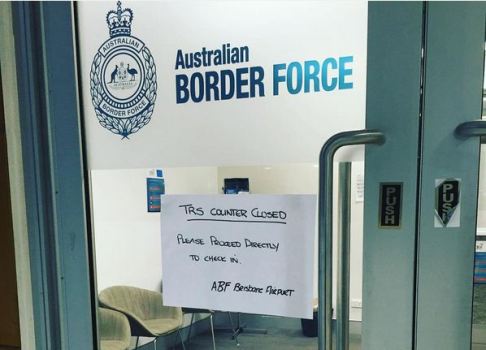
Happy financial new year? Not likely if you’re travelling mid-week.
Major disruption at international airports is primed to mar the official ‘standing up’ of Australia’s latest public sector mega-merger, the Department of Immigration and Border Protection and its new frontline operational border agency, the Australian Border Force, on its very first day.
Unionised staff at the new entity are continuing their preparations to go on strike on Wednesday 1st July as the Community and Public Sector Union ramps-up protected action across the public service to try and force the Abbott government’s hand pushing through deeply unpopular cuts to conditions and entitlements in many agencies.
The union has warned that international airports to be affected by the two hour strikes include Sydney, Melbourne, Brisbane, Gold Coast, Cairns, Adelaide, Perth and Darwin.
The confirmation of the latest industrial action comes despite a last minute back down by the government to provide assurances to Customs staff transitioning into Immigration and Border Protection that they will not be immediately left out of pocket to the tune of thousands of dollars a year because of the consolidation through changes to entitlements, allowances and conditions.
“The Secretary of the Department issued a determination under section 24 of the Public Service Act 1999 on Friday that will provide transition payments and provisions equivalent to most current allowances from the 1st of July for Customs Officers who currently receive them,” the CPSU said in a bulletin to members.
“The Parliamentary Secretary to the Prime Minister has also issued a section 24 (3) determination preserving all Marine Unit conditions of employment post 1 July and until a new Departmental Enterprise Agreement is reached.”
The continuation of the allowances until a new enterprise agreement is reached is a tactical victory for the CPSU which has managed to galvanise substantial new support within Customs to preserve longstanding conditions.
“This immediately prevents Customs Officers from losing thousands of dollars in take home pay from 1 July. The Department and Government has held this over staff for months. This Determination makes a huge difference to members who were facing enormous financial hardship from 1 July,” the CPSU told its members.
“Make no mistake, by standing together, joining our union in huge numbers and participating actively in industrial action, CPSU members in DIBP and ACBPS have achieved a significant win. But it’s only a temporary stay of execution,” the union said.
The latest strike action is a serious headache for the government on two fronts.
Firstly, the walk-off by those charged with defending the integrity of Australia’s borders comes at a time when government members are seeking to get maximum political mileage from border protection issues.
Secondly, unlike previous lower impact CPSU action, the disruption at airports and sea ports is certain to register in the minds of affected travellers and businesses keen to avoid any industrial brawl at the nation’s entry and exit points.
The CPSU’s National Secretary, Nadine Flood, wasn’t making any apologies for the disruptions saying striking staff were some of the worst affected under enterprise offers that had been resoundingly rejected.
“Customs and Immigration officers are being hit particularly hard by the Abbott Government’s bargaining policy which forces their agency to cut many of the allowances they rely on to make up their pay packet, Ms Flood said,”
“Thousands of officers face losing $5000 to $8000 a year; while small groups of highly specialised officers stand to lose even more take home pay. We have Border Protection workers desperately worried about how they’ll pay their bills and that is appalling.
“These men and women literally put their lives on the line to keep Australia safe.”
The Australian Customs and Border Protection Service is standing by its original advice to customers and travellers. Deputy chief executive for Border Operations, Michael Outram, said this month that arrangements were place “to protect Australia’s borders and minimise the impact on business operations.”
“While there will be some delays in services, we anticipate that contingency measures in place will keep interruptions to a minimum. The Portfolio regrets any inconvenience this industrial action may cause the public and industry,” Mr Outram said.
“During protected industrial action, the health and safety of our people and the protection of the border continue to be our priority.”
Comment below to have your say on this story.
If you have a news story or tip-off, get in touch at editorial@governmentnews.com.au.
Sign up to the Government News newsletter

